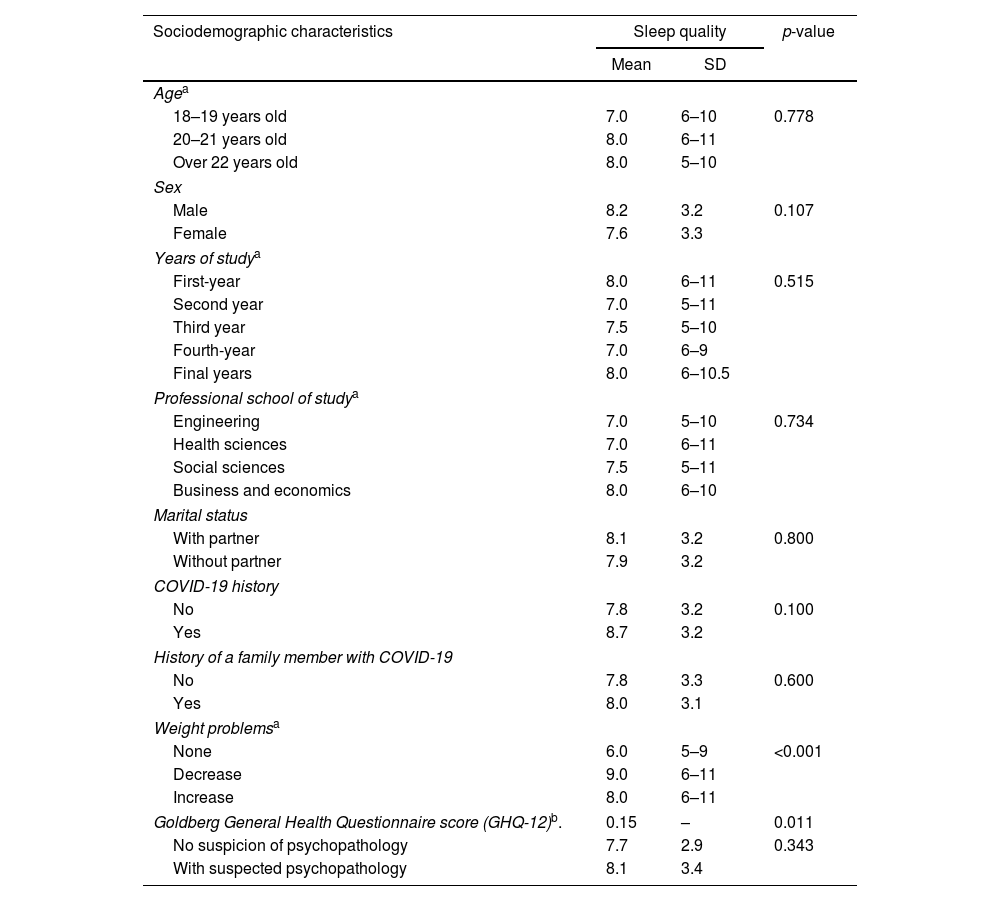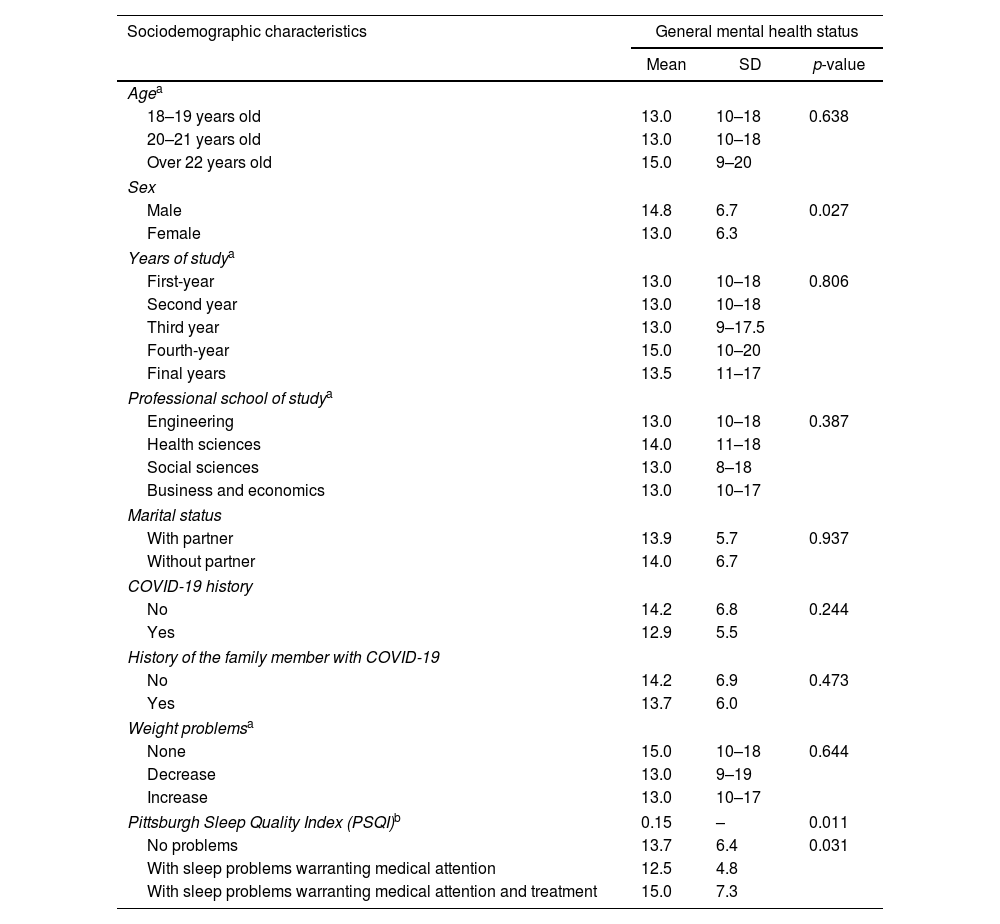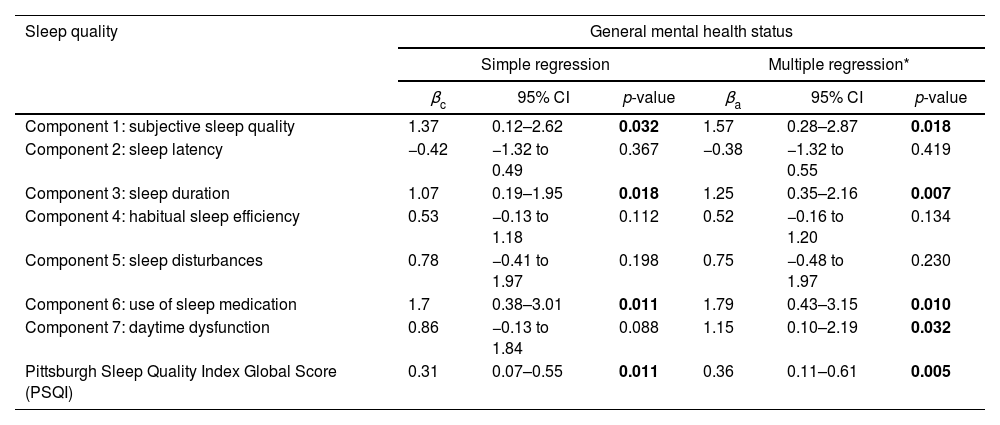The objective was to evaluate the association between sleep quality and mental health in students at a jungle university in Peru.
Materials and methodsAn analytical cross-sectional study was conducted on university students ≥18 years old during September and November 2020. Mental health status was measured with General Health Questionnaire (GHQ-12), and sleep quality with the Pittsburgh Sleep Quality Index (PSQI). The association was assessed using linear regression models, and crude (βc) and adjusted (βa) beta regression coefficients with their respective 95% confidence intervals (95%CI) were estimated.
ResultsTwo hundred and seventy-nine students were evaluated, 35.1% were 20–21 years old and 56.6% were male. The mean PSQI was 7.9±3.2, and 75.3% presented sleep problems. The mean GHQ-12 was 14.0±6.6, and 57.7% showed suspected psychopathology. The total sleep quality score (βa=0.36; 95% CI: 0.11–0.61; p=0.005), as well as, higher component scores, subjective sleep quality (βa=1.57; 95% CI: 0.28–2.87; p=0.018), sleep duration (βa=1.25; 95% CI: 0.35–2.16; p=0.007), hypnotic medication use (βa=1.79; 95% CI: 0.43–3.15; p=0.010), and daytime dysfunction (βa=1.15; 95% CI: 0.10–2.19; p=0.032), were associated with worse mental health status score.
ConclusionAfter 6 months of initiation of COVID-19 confinement, the frequency of sleep disturbance and mental health were elevated. Sleep quality disturbance was associated with worse mental health status.
Evaluar la asociación entre la calidad del sueño y la salud mental en estudiantes de una universidad de la selva de Perú.
Materiales y métodosSe realizó un estudio transversal analítico en universitarios ≥18 años durante septiembre y noviembre de 2020. El estado de la salud mental fue medido con General Health Questionnaire(GHQ-12) y la calidad del sueño con el Pittsburgh Sleep Quality Index (PSQI). Se evaluó la asociación mediante modelos de regresión lineal y se estimaron los coeficientes de regresión beta crudo (βc) y ajustado (βa) con sus respectivos intervalos de confianza (IC) a 95%.
ResultadosSe evaluaron 279 estudiantes, 35,1% tenían 20-21 años y 56,6% eran varones. La media del PSQI fue de 7,9±3,2, y 75,3% presentaron problemas de sueño. La media del GHQ-12 fue de 14,0±6,6, y 57,7% mostraron sospecha de psicopatología. El puntaje total de la calidad de sueño (βa=0,36; IC 95%: 0,11-0,61; p=0,005), así como, un mayor puntaje de los componentes. la calidad subjetiva del sueño (βa=1,57; IC 95%: 0,28-2,87; p=0,018), duración del sueño (βa=1,25; IC 95%: 0,35-2,16; p=0,007), uso de medicación hipnótica (βa=1,79; IC 95%: 0,43-3,15; p=0,010), y disfunción diurna (βa=1,15; IC 95%: 0,10-2,19; p=0,032), se asociaron a un peor puntaje del estado de salud mental.
ConclusiónTras seis meses de iniciado el confinamiento por COVID-19, la frecuencia de trastornos del sueño y salud mental fueron elevados. La alteración de la calidad del sueño se asoció a un peor estado de salud mental.










